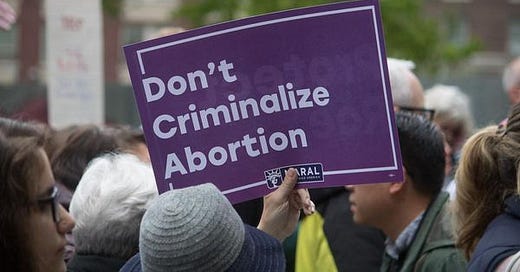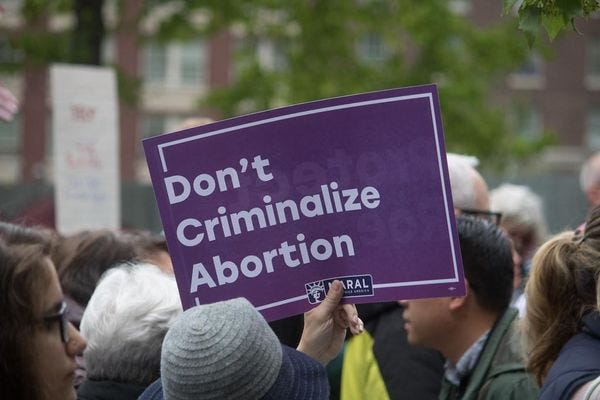
Ohio Will Prosecute Your Doctor For Your Abortion, And Sixth Circuit Says THAT'S GREAT!
It is in fact still legal to have an abortion, even in Ohio. And yet somehow your doctor is an 'accomplice' in this legal act.
For the moment, it's still legal in Ohio to have an abortion. And it's still legal to seek an abortion because you are carrying a fetus with Down syndrome. But if you tell your doctor the truth about your reasons for seeking to terminate your pregnancy, he risks going to jail if he provides you that care to which you are entitled under the Fourth Amendment. So the Sixth Circuit would like you to lie to your doctor in the interest of "protecting the Down syndrome community from the stigma it suffers from the practice of Down-syndrome selective abortions."
You got that? A legally privileged conversation between you and your doctor is an attack on a community of people with disabilities. And, oh by the way, you're also participating in a Nazi-style campaign of "eugenics."
It's a really bad decision , and worse still, it's specifically crafted to get Justices John Roberts and Brett Kavanaugh to sign on.
The Sixth Circuit, home to six brand new Trump appointees, has made a major rightward swing in the past four years, which is how a 9-7 majority wound up signing on to an opinion that refers to the doctor in this scenario as an "accomplice."
"By preventing the doctor from joining the woman as a knowing accomplice to her Down-syndrome selective decision making, H.B. 214 prevents this woman from making the doctor a knowing participant (accomplice) in her decision to abort her pregnancy because her fetus has Down syndrome," writes Judge Alice Batchelder, a George H.W. Bush appointee.
The term "accomplice" usually refers to someone abetting an actual crime. But the court goes to great pains to say that it's not criminalizing abortion — it's criminalizing "discrimination" against "the Down syndrome community."
It's a particularly clumsy sleight of hand, since the pregnant person isn't engaging in any legally cognizable form of discrimination. And indeed a pre-viable fetus is not a "person" in the eyes of the law, and thus cannot be a member of any "community." Nonetheless, those nine judges are certain that the statistical absence of babies born with Down syndrome harms that community, and so the state has a compelling interest in barring doctors from providing abortions to women making the entirely legal decision to seek it. And that interest overrides both the First Amendment right to speak openly to one's doctor and the Fourth Amendment right of privacy to access abortion care.
Indeed, the majority makes no bones about it: This opinion supports the right of a state to harass and stigmatize women seeking abortion care and shame them into silence about their decisions.
Moreover, it is questionable whether a woman would willingly announce that motive if she recognized that doing so was hurtful to many in the Down syndrome community. To the extent that H.B. 214 might influence a woman to misrepresent her reason, that would be her personal choice. Regardless, as a practical matter, any burden the woman feels from withholding this reason from the doctor who will perform her abortion is included in the first item on the list. The possibility that a woman, when speaking with the doctor who would perform her abortion, might decide to change her reason (or lie about her reason) on sober second thought is not a separate burden on a woman's ability to choose or obtain an abortion.
This law doesn't even gesture at a fig leaf of medical necessity, like those requiring hospital admitting privileges for doctors providing abortion care, or requiring expensive retrofitting of clinics to make walls as wide as a bowling alley to wheel gurneys through. This is a law that says the state gets to regulate pre-viability abortions for the benefit of someone other than the pregnant person or the fetus. And the court is blessing it using Chief Justice John Roberts's concurrence in last year's June Medical Services v. Russo , in which he seemed to endorse a theory that the only issue in evaluating abortion regulations is whether they place a "substantial obstacle" to abortion access — the state doesn't even have to pretend to be concerned with the health and safety of women or pre-viable fetuses, and there is no need to evaluate whether the law poses an undue burden on women's access to care.
Furthermore, the Sixth Circuit treats as settled law the idea that the state may now regulate pre-viability abortions at will as long as they don't enact "substantial obstacles" to access. And in the majority's opinion, forcing women to lie to their doctors, or find another abortion provider if they've told the truth about their reasons for seeking an abortion, poses no "substantial obstacle" to care.
And even if Justice Roberts sees through this ridiculous ruse, June Medical was a 5-4 decision with Justice Ruth Bader Ginsburg in the majority. What are the odds that Justice Amy Coney Barrett is A-OK with forcing women to lie to their doctors and shaming them for accessing abortion care?
Yeah, it's BAD.
[ Preterm-Cleveland v. McCloud / Regulatory Review / CNN ]
Follow Liz Dye on Twitter RIGHT HERE!
Please click here to support your Wonkette. And if you're ordering your quarantine goods on Amazon, this is the link to do it.












How many times do we have to read articles from astonished pollsters noting that pro-choice positions don't actually drive voters away? I feel like I read one every four years.
They are targeting an undesirable demographic. Ever try to better your life with more kids than you can handle?